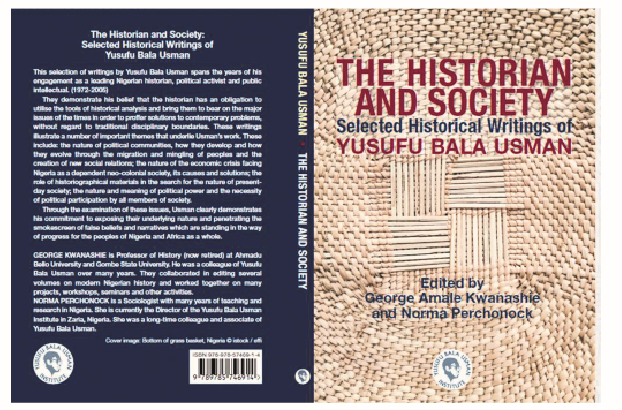A collection of twelve essays of the late Dr Yusufu Bala Usman, The Historian and Society: Selected Historical Writings of Yusufu Bala Usman, is a tribute to Dr Usman’s intellectual contributions to the critical public issues of his time, who during his lifetime was largely famous for his intellectual influence on the generation of scholars he trained.
Published September 24, 2023, to commemorate the 18th anniversary of his death, the book is compiled by his colleagues at Ahmadu Bello University (ABU) Zaria, George Amale Kwanashie and Noma Perchonock, and features more of Usman’s unpublished works that center on both historical and contemporary topics with extensive backgrounds relevant for their comprehension.
As a work that highlights Usman’s capacity to contextualize contemporary issues within their historical backgrounds, five recurrent themes emanate from these essays written at different times and contexts. The first, is the writer’s emphasis on the long-standing historical connections of economic, social, and cultural relationships linking the various ethnicities inhabiting all areas and regions of present-day Nigeria. Two, Ethnocentrism, of which the writer tirelessly criticizes. Three, the rejection of the concept that Nigeria’s pre-colonial history as nothing more than an endless warfare amongst various communities and polities, as well as his preferential reliance on primary internal sources for the reconstructing of pre-colonial history. Fourth, the extension of his argument on the historical connections of economic, social and cultural relationships in the historical development of Nigeria to Africa, and finally, the highlighting of an integral link between historical and contemporary events. That is to say, the writer puts forward the centrality of economic, social, political and cultural linkages in historical development, to illuminate contemporary problems and challenges facing Nigeria and Africa at large.
At initial perusal of these essays one is uncertain whether the author leans towards the Marxist and Socialist approach to public policy intervention. Careful observation of his use of certain words like relations to production, primacy of material conditions in historical development, people’s power and workers’ power suggests so.
In any case, the image of Dr Yusufu Bala Usman reflected from this book is that of an erudite historian, with deep interest in internal sources of African history, as well as strong critic of colonial historiography. He was a Nigerian patriot vehemently opposed to ethnic-nationalism. A public intellectual able to bring his vast knowledge of history to illuminate contemporary issues. He was articulate and very clear in his arguments, although most of his generalizations about African history, in regards to use of internal primary sources in critiquing ethnocentrism and racism were often problematic.
These complexities and fascinating historical linkages approach make the essays interesting and illuminating.





